CPU Performance
So for the last few days I’ve been testing, retesting, and working on our Ryzen coverage but at the last possible minute, I did run into a problem with our R7 1700 CPU that required a new CPU to be sent out to me. So I will have to follow up with the performance numbers with that CPU, so right now we are just taking a look at the Ryzen R7 1800X and the R7 1700X. With the 1800X, AMD is suggesting it is comparable to the i7-6900K and the 1700X is comparable to the i7-6800K. It just happens Asus sent over an i7-6900K for our Crush Project Build so I was able to bust it out to get comparison numbers as well. Our test suite has changed a little from last year, you can spot the new tests or tests that the new RX480 for the graphics card effected all have fewer results but I did keep around what I could of the tests that go back a lot farther. I suspect a lot of the people looking at Ryzen have been holding off their upgrade for a very long time, so I wanted some of you to be able to at least get an idea of how it will compare.
I should also point out that prior to and during my testing I spent a lot of time toying with memory settings. With AM4 being completely new there seems to be a few bugs with memory handshakes. This lead to memory compatibility issues with our normal Kingston ram and later I also had a few issues when I turned the XMP on with our Corsair kit as well. Most of the issues weren’t crashing, but there were issues with performance dropping when going higher on the clock speeds. Setting to 3000MHz or above would put it into an Overclocking mode and XFR would turn off causing my numbers to drop. To be safe I ran all of the tests at 2666MHz, not the 3000MHz of our Corsair kit for this reason.
I jumped into my testing with a few tests to check out encoding and rendering performance. I started off with our slightly old, but still reliable X264 HD Benchmark where we see the encoding performance of the two CPUs while encoding a video to x264. This is a test that typically likes clock speeds a lot more than cores, so I wasn’t surprised at all that the two Ryzen processors came in a little farther down the chart. The last few generations of Intel still came out ahead, with the 7700K topping the chart, even above the 6900K.

I then moved on to my favorite test in our whole test suite. Some of you may have been looking into this test given that a lot of AMDs released numbers were based on this test. I like this one though because it is the one benchmark where we can take a look at overall performance of the CPU while rendering and then drop down to one core and test it again. This helps compare the differences between high core count CPUs like the 1800X and 1700X and then check out the architecture performance, even if there are fewer cores. So in the multi-core test, the 1800X jumped right out into the lead, above the always impressive 6900K. The 1700X, with its lower clock speeds, was also close but slightly behind. The 7700K, on the other hand, came in WELL below those three because it has half the threads. In the single core test though the 7700K was able to spread its legs a little and pull out ahead. In fact, even the older 6700K has some performance on the new Ryzen CPUs on a per core level. The 1800X did still come in close behind the 6900K though.


wPrime is another oldie but a goodie that I like to check out. This is just a basic prime calculations test and the lower the number in this one the better. The 16 thread 1800X and 1700X both performed really well here. The 6900K was still slightly faster, but I was impressed with how they compared to the 5960X and the 7700K with the test taking over a minute longer on Intel’s Flagship mainstream CPU. I also took a look at 7-Zip, this is a new test for me but it has been around for a very long time as well. I just wanted to see how well Ryzen would compare in decompressing and compressing zipped files and not surprisingly the high core count really helped here with them both coming in ahead of the 6900K and 7700K.
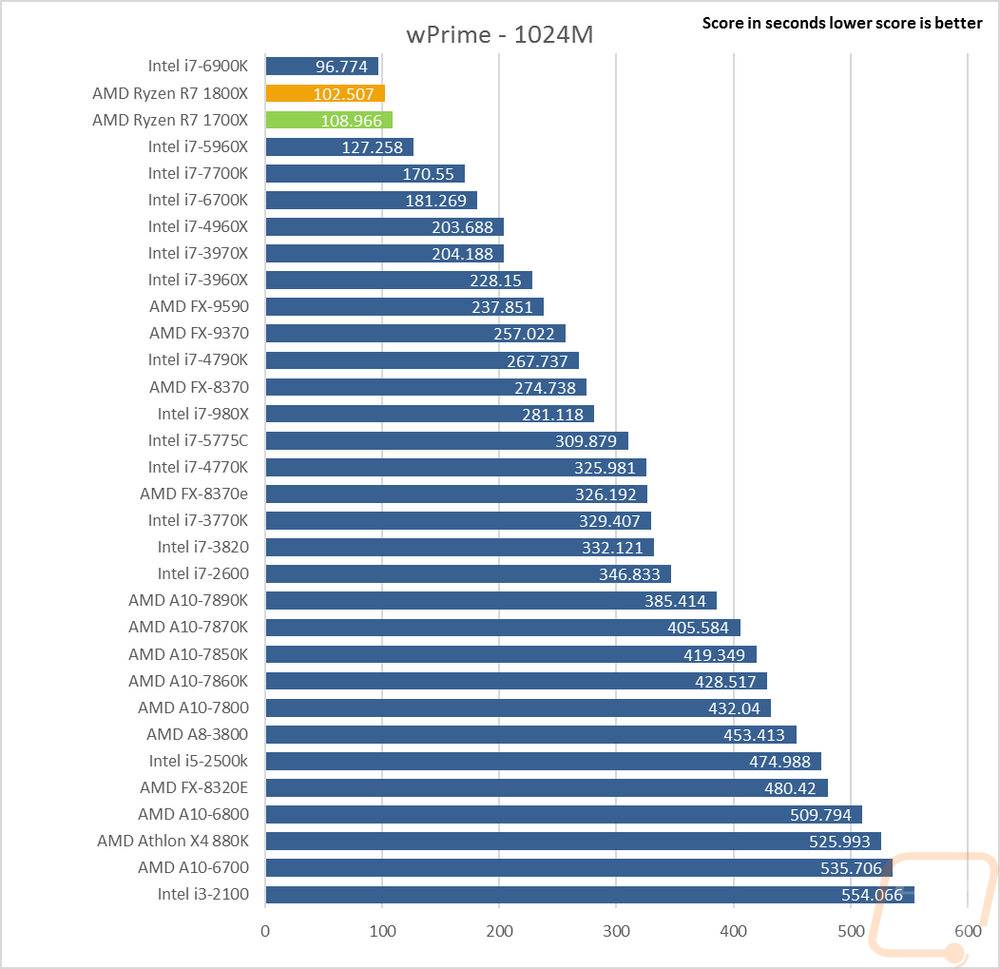
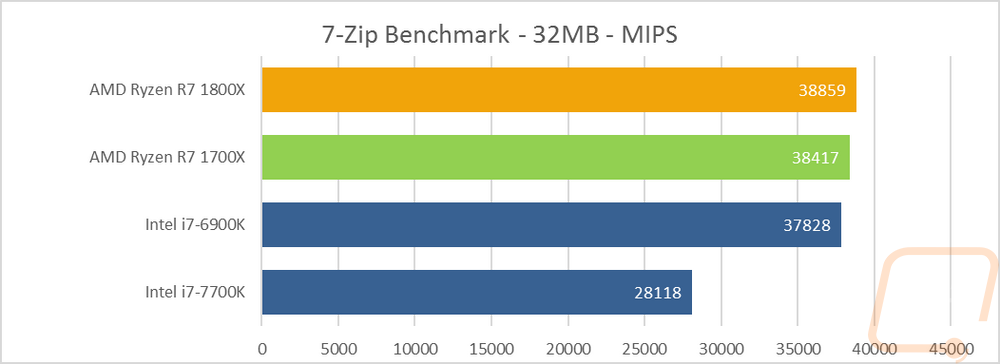
Also new are a few tests I like to use when testing phones and I thought they would be a good fit here as well. Google Octane and Jetstream both test in a wide range of ways to test how a computer will perform in different web environments, especially in Java. No one likes slowdowns when you get on a demanding website, so I included these to get a look at web browsing performance. In Google Octane, both Ryzen processors fell behind, but they did make it up in Jetstream. The higher single core speeds of the 7700K still dominated, but they all performed well.

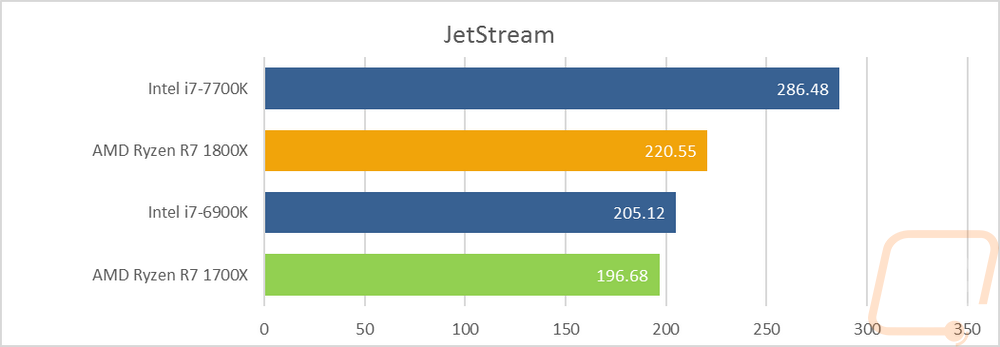
For overall benchmarks that look at all aspects of a computer's performance I turned to Passmark and Futuremark. Passmarks Performance Test has always been great to us and I included both Performance Test 8 and 9 results to keep our past results available for comparison while transitioning to the newer program. In both, I focused just on the CPU scores and both tests favor higher core/thread counts over per core performance so the 1800X and 1700X both performed well. The 6900K was still a lot faster though in both tests. Then in PCMark 8, I went for the whole test. It tests storage performance and real world productivity tests along with a little gaming. In this test, both the 7700K and 6900K came in ahead of both Ryzen CPUs. The memory limitations I ran into may have played a part in this one, I hope to be able to test more later on as memory handshake issues smooth out.


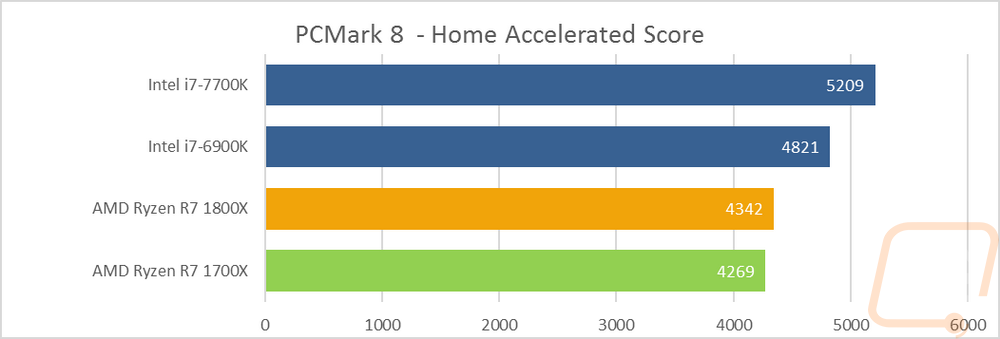
Next, I wanted to start toying around with gaming related tests so I started with 3DMark Fire Strike using the performance setting. I only kept track of the physics score as it is the only score specific to the CPU performance and as you can see both CPUs did well, with the 6900K besting them by a small margin. I also added a new benchmark, the Dolphin 5.0 Benchmark. This tests the performance when running the Dolphin Wii emulator, an ultra-demanding emulator. It doesn’t care much for high core counts though and with that the better single core efficiency on the 6900K and 7700K allowed the test to complete faster, the scores below are the number of seconds it took to finish.
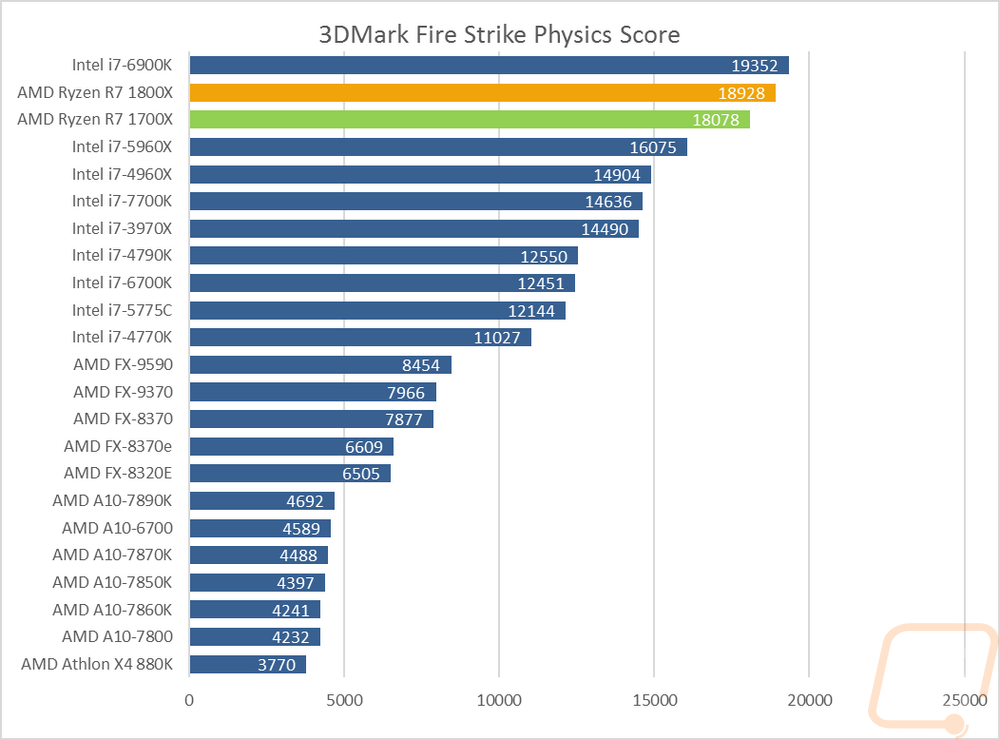

For my last few tests, I took a look at in game performance. I refreshed the games that we test with recently, but they are all still setup to focus the performance more on the CPU performance than overall performance. This is because I’m testing the CPUs, not the RX480. So I stuck with 1080p, turned down the detail in the ultra-demanding Ashes of the Singularity and I even used the CPU-focused benchmark in Ashes as well. What I found wasn’t exactly what I had hoped to find. In all of our other tests the 1800X and 1700X were right next to the 7700K and 6900K but here I did see more of a drop in performance. In Hitman they were within a few FPS and the same in Deus Ex, but the CPU-focused test in Ashes of the Singularity gave concerning results. I suspect there is a little more going on here with optimizations and I reached out to AMD with my concern and apparently I wasn’t the only one asking because they sent over a list of games that should perform better at 1080p I didn’t have time at the last minute to do a lot of retesting across all of the platforms though. They also address it with a few statements from game developers including Oxide who developed Ashes of the Singularity, but I will touch on that more in the final verdict section. Either way, I will be testing this more in the future with a wider range of games. Our CPU test suite isn’t specifically focused on gaming so the three games tested aren’t enough to draw complete conclusions with but It does seem there is room for improvement in the near future in the gaming performance.




